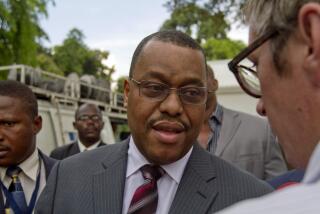Haiti Businessman Reverses, Accepts Post of Premier
- Share via
PORT-AU-PRINCE, Haiti — Smarck Michel, a wealthy businessman who originally rejected President Jean-Bertrand Aristide’s nomination as prime minister, has accepted a second offer after being assured he would have a free hand to direct a free-market economic program, U.S. and Haitian sources said Monday.
“It was settled finally this morning,” a senior U.S. official said after reports circulated that Aristide would submit Michel’s name to the Parliament today.
The appointment of Michel, who resigned from Aristide’s original Cabinet in June, 1991, because the two disagreed over both the president’s method of governing and his policies, puts an end to efforts by Aristide’s left-wing supporters and perhaps Aristide himself to name a prime minister more attuned to social programs than a free-market economy.
The chief candidate from that side was Claudette Werleigh, the foreign minister in the government’s acting Cabinet and a past supporter of a radical, populist government program.
Aristide aides said she was considered only after Michel had rejected the position, but some Haitian political experts said it is possible that the president had made his initial offer so conditional that Michel had to refuse.
“This would have cleared the way for a prime minister so aligned with his real thinking that she is called his twin,” one source said of Werleigh.
Her nomination was discarded in a Presidential Palace meeting of Aristide advisers and political leaders Thursday after Michel supporters successfully convinced the president that she would seriously hurt efforts to obtain foreign aid and investment, Haitian sources said.
Several respected economists and planners who are counted on by the United States and international development agencies and lending organizations to follow an austere free-market economy had made it clear they would not serve under Werleigh.
Chief among these were Leslie Delatour, a recent Aristide adviser and free-market advocate who drafted an economic plan endorsed by the president and enthusiastically received by the United States and the other developed nations.
In addition, Leslie Voltaire, an admired economic planner, and Marie-Michele Rey, an experienced and respected private banker, also ruled themselves out if Michel was not persuaded to reconsider his rejection.
Sources said Delatour and Rey will be offered jobs as finance minister and Central Bank president, respectively. Voltaire will serve as either planning minister or an economics adviser.
Under Haitian law, Aristide submits his nomination for prime minister to the Parliament for approval. The Cabinet ostensibly is selected by the prime minister and ratified separately.
Michel, a 57-year-old rice importer and wholesaler, first turned down the prime minister’s position one or two days before Aristide returned Oct. 15 to reclaim the office taken from him three years earlier in a military coup, the sources said.
Associates said Michel was unsettled by Aristide’s apparent ambivalence about pursuing an aggressive free-market economic program as his main policy in the 15 months left in his term.
“Furthermore,” a political associate said, “Smarck thought he saw the same signs that caused the first break.”
He was referring to Michel’s resignation as commerce minister in 1991 in a dispute over fixing prices and government subsidies of food products.
“The surface reason was a disagreement over whether the government should help people by lowering the cost of living by reducing prices or by creating jobs and cutting government intervention,” another Haitian political figure said.
“Another equally important and maybe more important reason was Aristide’s practice of telling Smarck one thing in the morning and then meeting someone with a different view and changing his mind in the afternoon.”
U.S. officials here and in Washington had sought to induce Michel to change his mind almost from the moment he rejected the first offer. Ranking Clinton Administration officials in Washington pressed Aristide, through his U.S. advisers, to assure Michel that he would have authority to carry out his program.
The same message was delivered in several phone conversations and two meetings that U.S. Ambassador William L. Swing had with Aristide last week, sources said.
When it became clear late last spring that Aristide would actually return, Michel was not the Clinton Administration’s first choice for prime minister, one diplomat said, “because they were concerned he wouldn’t be independent enough and because the traditional business elite doesn’t really know him.”
There was concern on some counts, one businessman here said, “that he was too sympathetic to Aristide’s original position and that he was resentful of the old elite because they never accepted him.”
Michel, who is married and has two daughters, comes from the relatively humble background of a father who was an army captain. Yet he was able to study business in the United States and became a millionaire on his own in the risky field of commodities trading.
“Michel is a good compromise,” a senior U.S. diplomat said Monday. “He is close to Aristide, but he is trusted by the foreign financial community, and he’s shown that he’s no Aristide puppet.”
The two have been close friends since the 1980s, when Michel became involved in Catholic Church social programs involving Aristide, then an activist priest. Michel hid Aristide when he was pursued by military thugs and joined with other wealthy supporters to buy him a home to meet a constitutional requirement that presidential candidates own property.
Michel’s daughter Marjorie was Aristide’s 1990 campaign manager and served as his palace hostess at official events.
“The two have been friends for years; they even stayed friends after Smarck resigned,” a friend of Michel’s said. “I think that Aristide will keep his word because he knows that this time Smarck is serious.”
More to Read
Sign up for Essential California
The most important California stories and recommendations in your inbox every morning.
You may occasionally receive promotional content from the Los Angeles Times.













